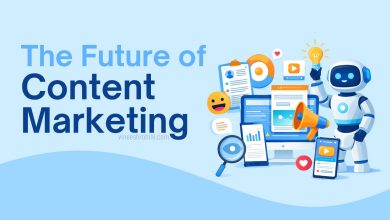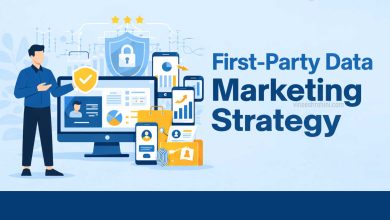How to Become a Digital Marketer ? : Comprehensive Guide 2024
How to Become a Digital Marketer : The digital age has revolutionized how businesses operate and engage with customers, leading to the rise of digital marketing as one of the most dynamic and in-demand career paths. Digital marketing encompasses a wide range of online strategies and techniques aimed at promoting products, services, or brands to a global audience. Whether you’re a student exploring career options, a professional seeking a career change, or an entrepreneur aiming to improve your business’s online presence, learning how to become a digital marketer can unlock numerous opportunities.
Table of Contents
This guide outlines the key steps, skills, and strategies necessary to embark on a successful career in digital marketing. By the end, you’ll have a clear roadmap to navigate this exciting field.
1. Understanding Digital Marketing

Before diving into the steps to become a digital marketer, it’s essential to understand what digital marketing is and why it matters.
What is Digital Marketing?
Digital marketing involves leveraging online platforms and technologies to reach and engage target audiences.
Buy Now : Professional Digital Marketing Course
Unlike traditional marketing, which relies on mediums like print, radio, and television, digital marketing operates in the digital space, including social media, search engines, websites, email, and mobile applications.
Why is Digital Marketing Important?
- Global Reach: Digital marketing allows businesses to connect with customers across the globe.
- Cost-Effective: Online campaigns can be more affordable and measurable compared to traditional advertising.
- Data-Driven Decisions: With tools like Google Analytics, marketers can track performance and optimize campaigns in real time.
- Consumer Behavior: The majority of consumers now research products and services online before making purchasing decisions.
Key Areas of Digital Marketing
Digital marketing is a broad field comprising several key areas, including:
- Search Engine Optimization (SEO): Improving a website’s visibility on search engines like Google.
- Content Marketing: Creating valuable content to attract and engage audiences.
- Social Media Marketing: Promoting brands on platforms like Facebook, Instagram, LinkedIn, and Twitter.
- Pay-Per-Click (PPC) Advertising: Running paid ads on search engines or social media.
- Email Marketing: Communicating with prospects and customers through email campaigns.
- Affiliate Marketing: Partnering with affiliates to promote products and earn commissions.
- Analytics and Data Management: Tracking and interpreting online metrics to inform marketing strategies.
2. Educational Background and Prerequisites
Do You Need a Degree?
While a formal degree in marketing, business, or a related field can be beneficial, it’s not mandatory to become a digital marketer.
Also Read : 10 Best AI SEO Tools for Optimizing Your Website in 2024
Many successful digital marketers are self-taught or have pursued online certifications.
Basic Skills and Attributes
To succeed as a digital marketer, you need:
- Creativity: Develop engaging and innovative campaigns.
- Analytical Thinking: Interpret data to optimize performance.
- Communication Skills: Write compelling content and build relationships.
- Adaptability: Stay updated with rapidly evolving technologies.
- Basic Tech Skills: Familiarity with tools like Microsoft Office, Google Workspace, and design software is an advantage.
Tools and Software
Digital marketers use a variety of tools to streamline their tasks:
- Google Analytics: For tracking website performance.
- Canva: For graphic design.
- Hootsuite: For social media management.
- Ahrefs/Moz/SEMrush: For SEO analysis.
- Mailchimp: For email marketing campaigns.
3. Steps to Become a Digital Marketer

Step 1: Build Foundational Knowledge
Start by understanding the basics of digital marketing through free and paid resources. There are numerous online platforms offering beginner-friendly courses, including:
- Google Digital Garage (Free)
- HubSpot Academy (Free)
- Coursera and edX (Paid)
These courses cover fundamental concepts like SEO, social media marketing, and content marketing.
Step 2: Develop Technical Skills
Master the tools and techniques used in digital marketing. Focus on:
- SEO: Learn how to optimize websites for search engines.
- Social Media Management: Understand how to create, schedule, and analyze social media campaigns.
- Content Creation: Develop skills in writing blogs, designing graphics, and producing videos.
- Data Analytics: Gain proficiency in tools like Google Analytics to monitor performance.
Step 3: Build Your Online Presence
Your online presence is your digital resume. Create and optimize your profiles on LinkedIn, Twitter, and other professional networks. A personal blog or portfolio showcasing your skills can also enhance your credibility.
Step 4: Gain Practical Experience
Hands-on experience is crucial in digital marketing. Start by:
- Freelancing: Offer your services to small businesses or startups.
- Internships: Join an agency or company to work under experienced marketers.
- Personal Projects: Create and manage your own blog, social media pages, or YouTube channel.
Step 5: Earn Certifications
Certifications can boost your credibility and help you stand out in a competitive job market. Some reputable certifications include:
- Google Ads Certification
- Facebook Blueprint Certification
- HubSpot Content Marketing Certification
- SEMrush SEO Toolkit Certification
Step 6: Network and Connect
Join digital marketing communities, attend webinars, and connect with industry professionals on LinkedIn. Networking can lead to mentorship opportunities, collaborations, and job offers.
Step 7: Apply for Jobs or Start a Freelance Career
Once you’ve gained experience and confidence, apply for digital marketing roles or establish yourself as a freelance marketer. Positions to consider include:
- Social Media Manager
- SEO Specialist
- PPC Specialist
- Content Marketer
- Email Marketing Specialist
4. Core Skills Required for Digital Marketing
Search Engine Optimization (SEO)
SEO involves optimizing websites to rank higher in search engine results. Key aspects of SEO include:
- Keyword research
- On-page and off-page optimization
- Link building
- Technical SEO (e.g., site speed, mobile-friendliness)
Content Marketing
Content marketing focuses on creating and sharing valuable content to attract and retain an audience. This includes blogs, videos, infographics, and podcasts.
Social Media Marketing
Social media marketing involves leveraging platforms like Facebook, Instagram, LinkedIn, and TikTok to promote products and build brand awareness. Skills in analytics and paid advertising are particularly valuable.
Paid Advertising (PPC)
Paid advertising involves creating and managing ad campaigns on platforms like Google Ads and Facebook Ads. Understanding ad targeting and budgeting is essential for success.
Email Marketing
Email marketing is one of the most cost-effective methods for engaging with customers. Skills in crafting engaging emails and segmenting audiences are critical.
Analytics and Reporting
Data analysis is the backbone of digital marketing. Skills in tools like Google Analytics, Tableau, and Excel are invaluable for tracking performance and making informed decisions.
5. Building a Successful Digital Marketing Career
Start Small
Don’t aim for perfection in the beginning. Experiment with small projects and gradually take on larger responsibilities as you gain confidence.
Keep Learning
The digital marketing landscape is constantly evolving. Stay updated by:
- Reading blogs (e.g., Moz, Neil Patel, HubSpot).
- Following industry leaders on social media.
- Enrolling in advanced courses.
Specialize
While being a generalist is useful, specializing in one area (e.g., SEO, PPC, or content marketing) can make you more valuable in the job market.
Track Results
Document your achievements, such as traffic growth, ROI improvements, or social media engagement rates. These metrics serve as proof of your skills.
6. Challenges in Digital Marketing
Constantly Changing Trends
Digital marketing trends and algorithms evolve rapidly. Staying relevant requires continuous learning.
High Competition
With so many aspiring digital marketers, standing out can be challenging. Building a unique personal brand is crucial.
Multitasking
Digital marketers often juggle multiple projects simultaneously, requiring strong organizational skills.
Client Expectations
Managing client expectations and delivering measurable results can be demanding.
7. The Future of Digital Marketing

The demand for digital marketers is only expected to grow as businesses continue to prioritize online engagement. Emerging technologies like artificial intelligence (AI), voice search, and augmented reality (AR) are likely to shape the future of digital marketing.
Key Trends to Watch
- AI-Powered Tools: Automating tasks like content creation and customer service.
- Voice Search Optimization: Adapting content for voice-activated devices.
- Video Marketing: Leveraging platforms like YouTube and TikTok.
- Sustainability Marketing: Promoting eco-friendly products and practices.
How to Become a Digital Marketer – Conclusion
Becoming a digital marketer is an exciting and rewarding journey that offers endless opportunities for growth.
Buy Now : Professional Digital Marketing Course
By mastering the skills, staying updated with industry trends, and gaining practical experience, you can carve out a successful career in this dynamic field. Whether you aim to work for a leading agency, start your own business, or freelance, the possibilities in digital marketing are vast and ever-evolving.
Take the first step today, and embark on a journey that could transform your career and open doors to a world of possibilities!
Keywords : How to Become a Digital Marketer – How to Become a Digital Marketer 2024 – How to Become a Digital Marketer 2025



